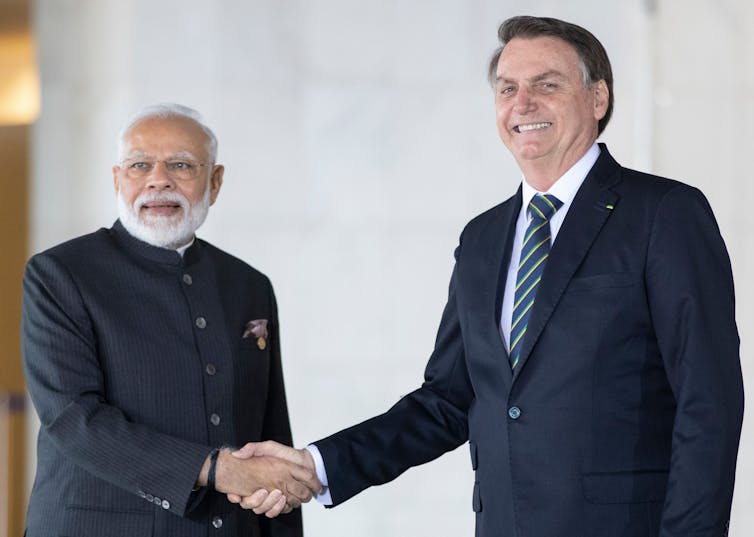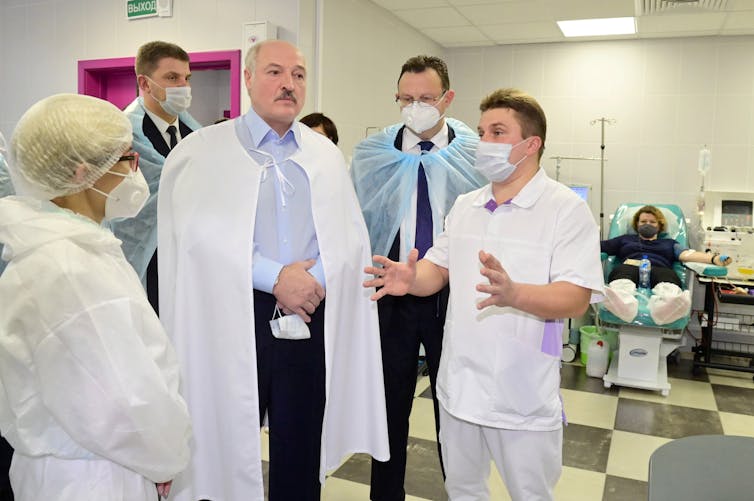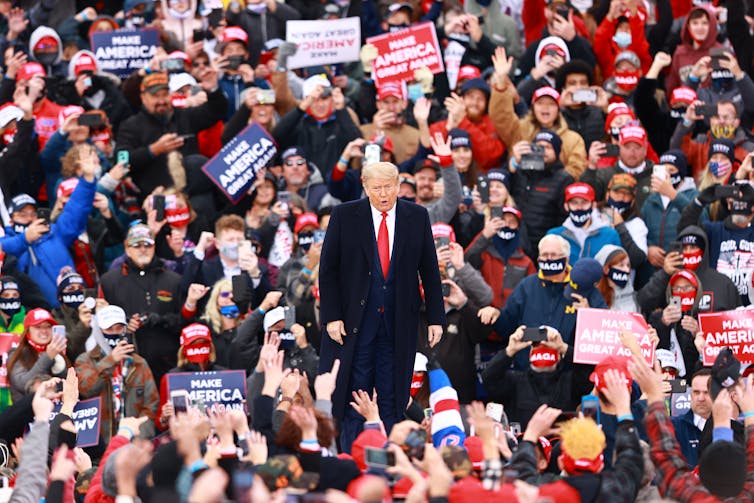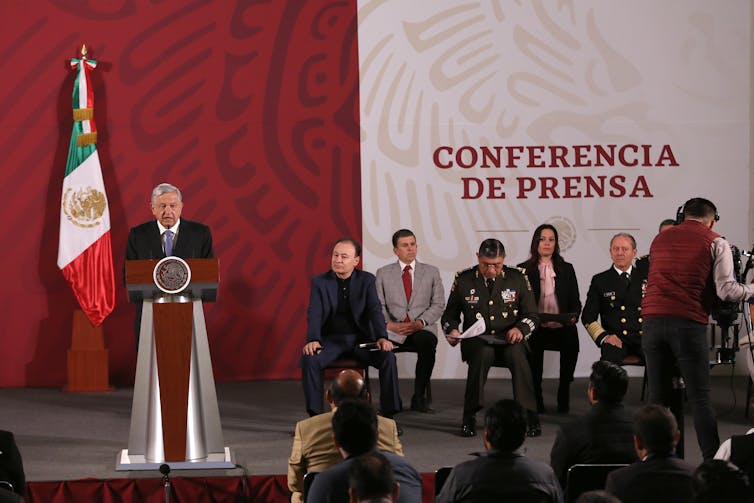Though there's some overlap, there are some surprises
First list, from The Conversation:
World's worst pandemic leaders: 5 presidents and prime ministers who badly mishandled COVID-19
 |
| Brazilian president Jair Bolsonaro and Indian Prime Minister Narendra Modi are both accused of mishandling their countries’ COVID- 19 outbreaks. Pavel Golovin/Pool/AFP via Getty Images |
Narendra Modi of India
By Sumit Ganguly, Indiana University
India is the new epicenter of the global pandemic, recording some 400,000 new cases per day by May 2021. However grim, this statistic fails to capture the sheer horror unfolding there. COVID-19 patients are dying in hospitals because doctors have no oxygen to give and no lifesaving drugs like remdesivir. The sick are turned away from clinics that have no free beds.
Many Indians blame one man for the country’s tragedy: Prime Minister Narendra Modi.
In January 2021, Modi declared at a global forum that India had “saved humanity … by containing corona effectively.” In March, his health minister proclaimed that the pandemic was reaching an “endgame.” COVID-19 was actually gaining strength in India and worldwide – but his government made no preparations for possible contingencies, such as the emergence of a deadlier and more contagious COVID-19 variant.
Even as significant pockets of the country had not fully suppressed the virus, Modi and other members of his party held jampacked outdoor campaign rallies before April elections. Few attendees wore masks. Modi also allowed a religious festival that draws millions to proceed from January to March. Public health officials now believe the festival may have been a superspreader event and was “an enormous mistake.”
As Modi touted his successes last year, India – the world’s largest vaccine manufacturer – sent over 10 million vaccine doses to neighboring countries. Yet just 1.9% of India’s 1.3 billion people had been fully inoculated against COVID-19 by early May.
Jair Bolsonaro of Brazil
By Elize Massard da Fonseca, Fundação Getulio Vargas and Scott L. Greer, University of Michigan
Brazilian president Jair Bolsonaro did not just fail to respond to COVID-19 – which he derides as a “little flu” – he actively worsened the crisis in Brazil.
Bolsonaro used his constitutional powers to interfere in the Health Ministry’s administrative matters, such as clinical protocols, data disclosure and vaccine procurement. He vetoed legislation that would have both mandated the use of masks in religious sites and compensated health professionals permanently harmed by the pandemic, for example.
And he obstructed state government efforts to promote social distancing and used his decree power to allow many businesses to remain open as “essential,” including spas and gyms. Bolsonaro also aggressively promoted unproven medicines, notably hydroxychloroquine, to treat COVID-19 patients.
Bolsonaro used his public profile as president to shape the debate around the coronavirus crisis, fostering a false dilemma between economic catastrophe and social distancing and misrepresenting science. He has blamed Brazilian state governments, China and the World Health Organization for the COVID-19 crisis, and has never taken responsibility for managing his own country’s outbreak.
In December, Bolsonaro declared that he would not take the vaccine because of side effects. “If you turn into a crocodile, it’s your problem,” he said.
Bolsonaro’s pandemic mismanagement created conflict within his government. Brazil cycled through four health ministers in less than a year. Brazil’s uncontrolled outbreak gave rise to several new coronavirus variants, including the P.1 variant, which appears more contagious. Brazil’s COVID-19 transmission rate is finally starting to drop, but the situation is still worrisome.
Alexander Lukashenko of Belarus
By Elizabeth J. King and Scott L. Greer, University of Michigan
 |
Many countries around the world have responded to COVID-19 with tragically inadequate policies.
However, we argue that the worse pandemic leaders are those handful who chose total denialism over ineffective action.
Alexander Lukashenko, the longtime authoritarian leader of Belarus, has never acknowledged the threat of COVID-19.
Early in the pandemic, as other countries were enforcing lockdowns, Lukashenko opted not to implement any restrictive measures to prevent the spread of COVID-19.
Instead, he claimed the virus could be prevented by drinking vodka, visiting the sauna and working in the fields. This denialism essentially left preventative measures and pandemic aid to individuals and crowdfunding campaigns.
Over the summer of 2020, Lukashenko stated that he had been diagnosed with COVID-19 but that he was asymptomatic, which allowed him to continue insisting that the virus was not a serious threat. Allegedly thwarting the disease and visiting COVID-19 hospitals without a mask also supported his desired image of a strong man.
Belarus has just started vaccination efforts, but Lukashenko says he won’t get vaccinated. Currently, fewer than 3% of Belarusians are inoculated against COVID-19.
Donald Trump of the United States
By Dorothy Chin, University of California, Los Angeles
Trump is out of office, but his mishandling of the pandemic continues to have devastating long-term consequences on the United States – particularly on the health and welfare of communities of color.
 |
| Trump at a campaign rally on Oct. 17, 2020, in Muskegon, Michigan, after recovering from COVID-19. Rey Del Rio/Getty Images |
Unemployment rates are also disproportionate. During the worst of the U.S. pandemic, they soared to 17.6% for Latino Americans, 16.8% for African Americans and 15% for Asian Americans, compared with 12.4% for white Americans.
These crushing gaps amplified existing inequities such as poverty, housing instability and quality of schooling – and will likely continue to do so for some time to come. For example, while the overall U.S. economy shows signs of recovery, minority groups have not made equivalent progress.
Finally, Trump’s blame of China for COVID-19 – which included such racial epithets as calling the virus the “kung flu” – immediately preceded a nearly twofold increase in attacks on Asian Americans and Pacific Islanders in the past year. This disturbing trend shows no signs of abating.
The Trump administration supported the country’s initial development of the vaccine, an achievement few world leaders can claim. But the misinformation and anti-science rhetoric he broadcast continues to compromise America’s path out of the pandemic. Latest polling suggests 24% of all Americans and 41% of Republicans say they will not get vaccinated.
Andrés Manuel López Obrador of Mexico
By Salvador Vázquez del Mercado, Centro de Investigación y Docencia Económicas
 |
| López Obrador, maskless, announces a national lockdown on March 23, 2020, after weeks of encouraging Mexicans to keep up their regular routines. Adrián Monroy/Medios y Media/Getty Images |
With 9.2% of its COVID-19 patients dying from the disease, Mexico has the highest case fatality rate in the world. Recent estimates show that it has likely suffered 617,000 deaths – on par with the U.S. and India, both countries with much larger populations.
A combination of factors contributed to Mexico’s prolonged, extreme COVID-19 outbreaks. And inadequate national leadership was one of them.
Throughout the pandemic, Mexican President Andrés Manuel López Obrador sought to minimize the gravity of the situation in Mexico. In the very beginning, he resisted calls to enact a nationwide lockdown and continued holding rallies nationwide before eventually, on March 23, 2020, Mexico shuttered for two months. He frequently refused to wear a mask.
Having inherited an underfunded patchwork of health services when he took office in 2018, López Obrador increased health-related expenditures during the pandemic only slightly. Experts said hospital budgets are insufficient to the enormous task facing them.
Even before the pandemic broke out, López Obrador’s policy of extreme fiscal austerity – in place since 2018 – had made tackling a health crisis much more difficult by significantly limiting the COVID-19 financial aid available to citizens and businesses.
That, in turn, aggravated the economic shock caused by the pandemic in Mexico, feeding the need to keep the economy open all last year, well into the ferocious winter second wave, from which Mexico is only beginning to emerge.
Eventually, another lockdown became inevitable. Mexico shut down again briefly in December 2020.
Today, mask-wearing is up and Mexico has fully vaccinated 10% of its population, compared with 1% in neighboring Guatemala. Things are improving, but Mexico’s road to recovery is long.
Sumit Ganguly, Distinguished Professor of Political Science and the Tagore Chair in Indian Cultures and Civilizations, Indiana University; Dorothy Chin, Associate Research Psychologist, University of California, Los Angeles; Elizabeth J King, Associate Professor in Health Behavior and Health Education in the School of Public Health, University of Michigan; Elize Massard da Fonseca, Assistant Professor, Brazilian School of Public Administration, Fundação Getulio Vargas; Salvador Vázquez del Mercado, Conacyt Research Professor, National Laboratory of Public Policy, Centro de Investigación y Docencia Económicas, and Scott L. Greer, Professor, Global Health Management and Policy and Political Science, University of Michigan
This article is republished from The Conversation under a Creative Commons license. Read the original article.
[Like what you’ve read? Want more? Sign up for The Conversation’s daily newsletter.]![]()
Second list, from former Labor Secretary Robert Reich:
Why Strongmen
are Losing the Fight Against Covid
A
hospital in Uttar Pradesh, India’s most populous state, is being charged under
the country’s National Security Act for sounding the alarm over a lack of
oxygen that resulted in Covid deaths. 
Vladimir Putin claimed Russian developed the first COVID vaccine.
Gave lots of it to India. Putin did not make the other list, above
The hospital’s owner and manager
says the police have accused him of “false scare-mongering,” after
he stated publicly that four of his patients died on a single day when oxygen
ran out.
Since Covid-19 exploded in India, the prime minister, Narendra Modi, seems more intent on controlling the news than the outbreak. On Wednesday, India recorded nearly 363,000 Covid cases and 4,120 deaths, about 30 percent of worldwide Covid deaths that day.
But experts say India is vastly understating the true
number. Ashish Jha, dean of Brown University’s School of Public Health,
estimates that at least 25,000 Indians are dying from Covid each day.
The
horror has been worsened by shortages of oxygen and hospital beds. Yet Modi and
his government don’t want the public to get the true story.
One
big lesson from the Covid crisis: lying makes it worse.
Vladimir Putin is busily denying the truth about Covid in Russia. Demographer
Alexei Raksha, who worked at Russia’s official statistical agency, Rosstat, but
says he was forced to leave last summer for telling the truth about Covid,
claims that the daily data in Russia has been “smoothed, rounded, lowered” to
look better.
Like many experts, he uses excess mortality – the
number of deaths during the pandemic over the typical number of deaths – as the
best indicator.
“If
Russia stops at 500,000 excess deaths, that will be a good scenario,” he calculates.
Russia
was first out of the gate with a Covid vaccine but has fallen woefully behind
on vaccinations. Recent polling puts the share of Russians who don’t want to be
vaccinated at 60 to 70 percent. That’s because Putin and other
officials have focused less on vaccinating the public than on claiming success
in containing Covid.
The U.S. is suffering a similar problem – the legacy of another strongman, Donald Trump.
Although more than half of U.S. adults have received at least one dose
of coronavirus vaccine, more than 40 percent of Republicans have consistently told pollsters they won’t get
vaccinated. Their recalcitrance is threatening efforts to achieve “herd immunity” and
prevent the virus’s spread.
Like Modi and Putin, Trump minimized the seriousness of the pandemic and spread misinformation about it. Trump officials ordered the Centers for Disease Control and Prevention to downplay its severity.
He declined to get vaccinated
publicly and was noticeably absent from a public service announcement on vaccination that
featured all other living former presidents.
Trump
allies in the media have conducted a scare campaign about the vaccines. In
December, Laura Ingraham posted a story on Facebook from
the Daily Mail purporting to show evidence that Chinese
communist party loyalists worked at pharmaceutical companies that developed the
coronavirus vaccine.
As
recently as mid-April, Fox News host Tucker Carlson opined that if the vaccine
were truly effective, there’d be no reason for people who received it to wear
masks or avoid physical contact.
“So maybe it doesn’t work, and they’re simply not telling you that.”
Why
then should anyone be surprised at the reluctance of Trump Republicans to get
vaccinated? A recent New York Times analysis showed vaccination rates
to be lower in counties where a majority voted for Trump in 2020. States that
voted more heavily for Trump are also states where lower percentages of the
population have been vaccinated.
The
Republican pollster Frank Luntz claims Trump bears responsibility for the hesitancy of
GOP voters to be vaccinated.
“He
wants to get the credit for developing the vaccine. Then he also gets the blame
for so few of his voters taking it.”
Trump’s
Republican Party is coming to resemble authoritarian regimes around the world
in other respects as well – purging truthtellers and trucking in lies,
misinformation, and propaganda harmful to the public.
Last
week the GOP stripped Representative Liz Cheney of her leadership position for
telling the truth about the 2020 election. At last week’s congressional hearing
about the January 6 attack on the Capitol, one Republican congressman, Andrew
Clyde, even denied it happened.
“There
was no insurrection,” he said. “To call it an insurrection is a bold-faced lie
… you would actually think it was a normal tourist visit.”
Biden
says he plans to call a summit of democratic governments to contain the rise of
authoritarianism around the world. I hope he talks about its rise in the United
States, too – and the huge toll it’s already taken on Americans.
Robert Reich's latest book is "THE SYSTEM: Who Rigged
It, How To Fix It." He is Chancellor's Professor of Public Policy at the
University of California at Berkeley and Senior Fellow at the Blum Center. He
served as Secretary of Labor in the Clinton administration, for which Time
Magazine named him one of the 10 most effective cabinet secretaries of the
twentieth century. He has written 17 other books, including the best sellers
"Aftershock,""The Work of Nations," "Beyond Outrage,"
and "The Common Good." He is a founding editor of the American
Prospect magazine, founder of Inequality Media, a member of the American
Academy of Arts and Sciences, and co-creator of the award-winning documentaries
"Inequality For All," streamng on YouTube, and "Saving
Capitalism," now streaming on Netflix.
